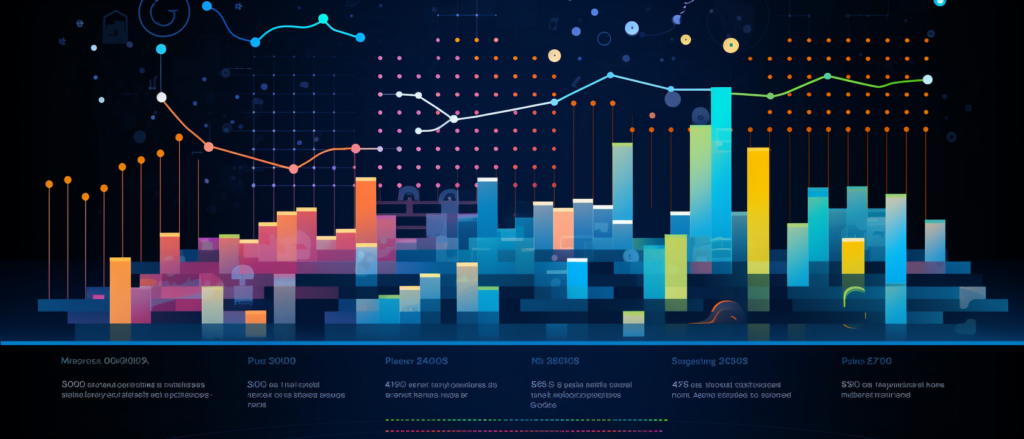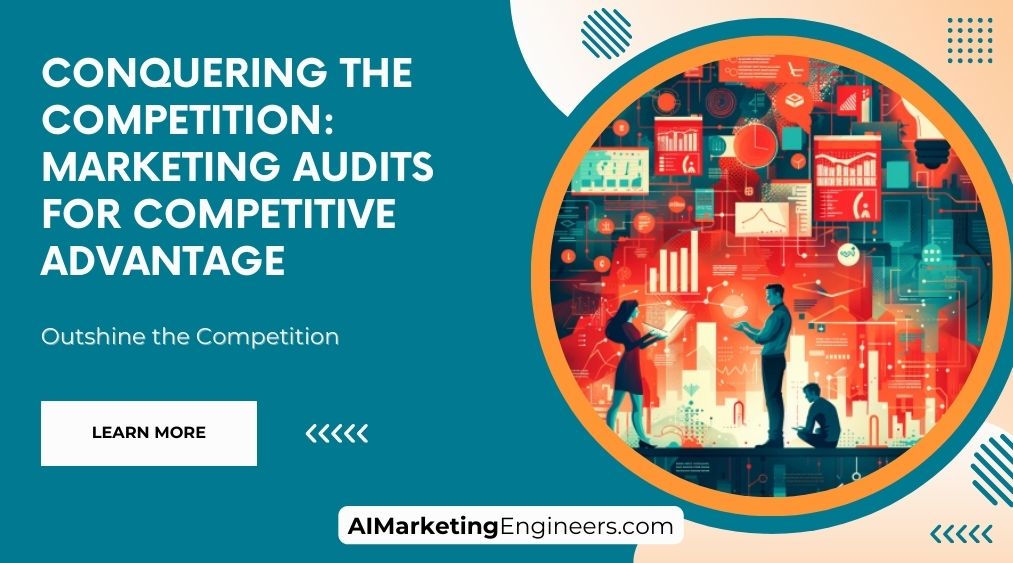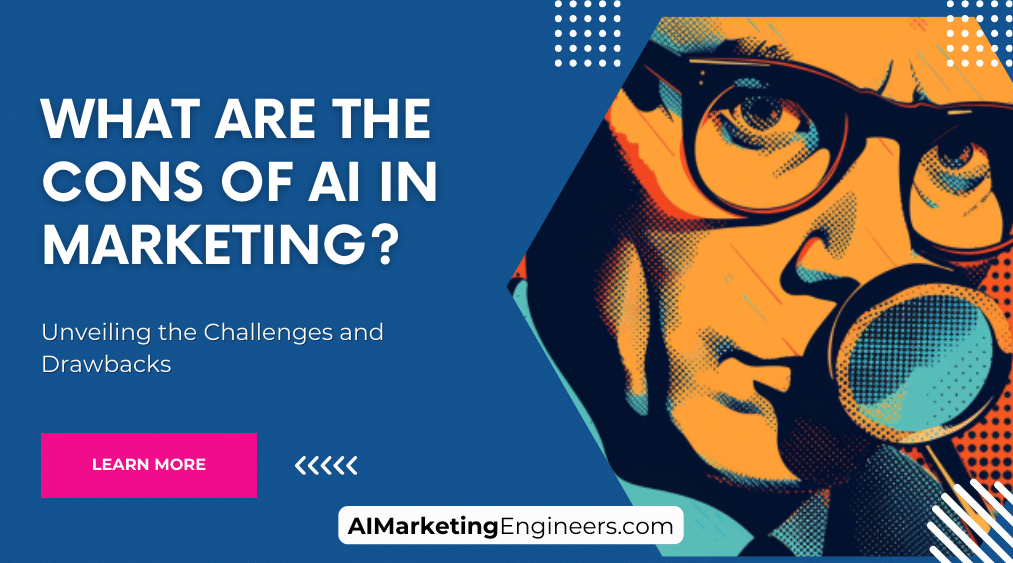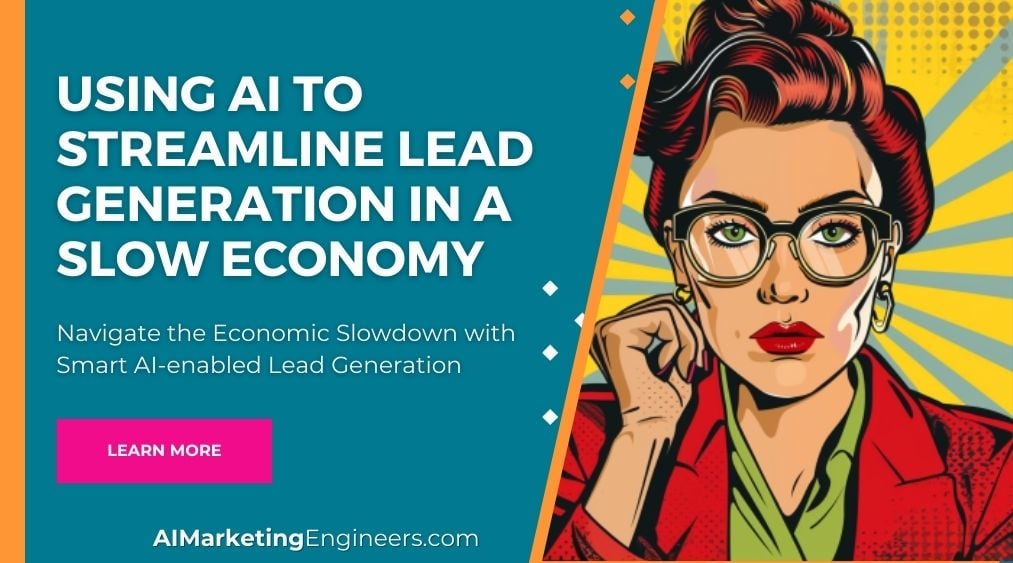Key Takeaways
✅ Personalization: AI excels in crafting personalized customer experiences by sifting through vast data, predicting individual preferences, and refining user engagement.
✅ Predictive Analytics: Leverage AI's predictive capabilities to identify future trends, empowering strategic decisions for high-impact marketing.
✅ Efficiency and Scalability: AI dramatically escalates the efficiency and scalability of data analysis, driving better marketing performance and ROI.

Introduction
Are you ready to shift your approach to marketing data analysis into high gear? What if you could decode your customer's next move, streamline your marketing campaigns, and skyrocket your ROI—all at breakneck speed? Welcome to the groundbreaking intersection of AI and Marketing Data Analysis – a dynamic duo that's transforming the marketing landscape.
AI in marketing isn't just a buzzword; it's the lynchpin to unlocking nuanced insights and personalizing the user experience like never before. With the adeptness of AI at your fingertips, bid farewell to guesswork and usher in an era of data-driven precision. Whether you're looking to refine customer segmentation, boost predictive analytics, or elevate marketing campaign management to unparalleled heights, AI is your powerhouse tool.
Embark on a journey with us as we delve into AI techniques like Machine Learning, NLP, and deep learning models that are not just redefining strategies but reinventing the very core of marketing. From thwarting customer churn to revolutionizing content recommendation systems, the applications of AI in marketing data analysis are vast and captivating.
Fasten your seatbelts, for you're about to tap into actionable insights and innovative methodologies that promise to redefine your marketing game. This is not just about keeping pace— it's about becoming a trendsetter in an AI-powered marketing world. Welcome to "Harnessing the Power of AI in Marketing Data Analysis."
Top Statistics
| Statistic | Insight |
|---|---|
| AI in Marketing Market Size: Valued at $20.3 billion in 2020, expected to grow at a CAGR of 32.4% from 2021 to 2028. (Source: Grand View Research) | This surging compound growth heralds a transformation in marketing, symbolizing immense potential for companies to harness AI capabilities. |
| Marketers Using AI: 61% worldwide are integrating AI into their marketing strategies. (Source: Statista) | Widespread adoption underscores AI’s significance in creating efficient, data-driven marketing plans. |
| Operationalizing AI: By 2024, 75% of enterprises are expected to transition from piloting to operationalizing AI. (Source: IDC) | Operationalizing AI means moving from experimentation to real-world implementations, reflecting a maturity in AI adoption that's reshaping the industry. |
| AI in Personalized Content: 57% of US marketers utilized AI for personalized content in 2020. (Source: eMarketer) | Tailored experiences differentiate brands in a crowded marketplace, and AI is the lynchpin in achieving this at scale. |
| AI Market Value: AI-powered marketing is projected to generate $31.5 trillion in business value by 2025. (Source: Forbes) | The forecasted business value emphasizes AI's foundational role in the future of effective and dynamic marketing strategies. |
Harnessing the Power of AI in Marketing Data Analysis
Artificial Intelligence (AI) has become an invaluable asset for marketing data analysis, transforming vast datasets into actionable insights. As businesses strive to adapt to competitive markets, understanding the dynamics of consumer behavior through data analysis is paramount. AI elevates marketing strategies by deriving meaning from patterns that traditional analysis might overlook.
Benefits of AI-driven Marketing Data Analysis
AI-driven solutions excel at customer segmentation and personalization, giving rise to marketing that resonates on an individual level. By leveraging these technologies, businesses can also witness enhanced prediction accuracy, which is fundamental in devising strategic decisions. Moreover, AI contributes to streamlined marketing campaigns, optimizing budgets and improving return on investment (ROI).
Types of AI Techniques for Marketing Data Analysis
There's a gamut of AI techniques that revolutionize marketing. Machine Learning (ML) algorithms are indispensable for predictive analytics, forecasting trends, and consumer actions. Natural Language Processing (NLP) excels in understanding consumer sentiments from textual data, while deep learning extends its brilliance to image recognition, enhancing effectiveness in visual advertising.
Applications of AI in Marketing Data Analysis
AI shines in preventing customer churn by detecting subtle behavioral cues. It enables companies to develop dynamic pricing strategies through anticipatory demand forecasting. Furthermore, it fine-tunes content recommendations, ensuring that customers find exactly what they desire, heightening engagement, and fostering loyalty.
Challenges and Limitations of AI in Marketing Data Analysis
Despite its prowess, AI faces hurdles like data quality and inherent biases in training datasets. Privacy concerns and meeting strict regulatory compliance are additional challenges. The Herculean task for many is the seamless integration of AI with the legacy systems that underpin existing marketing workflows.
Best Practices for Successful AI-based Marketing Data Analysis
The cornerstone of effective AI application in marketing analyses relies on a robust data foundation and stringent governance. Regular monitoring and validation of AI models safeguard against drifts in performance. Critical too is the collaborative synergy between marketers and data scientists, ensuring that technology translates effectively into marketing success.
AI is redefining the landscape of marketing data analysis. It's imperative that forward-thinking businesses harness AI's potential to stay competitive. As the field evolves, those who adeptly integrate AI into their marketing strategies stand to reap significant rewards.
Inspirational Quotes
1. "Data is the new soil." - David McCandless
2. "AI will transform marketing by giving us richer customer insights and helping us make smarter decisions faster than ever before." - Marc Benioff
3. "The future of marketing is about creating authentic customer experiences, and AI will play a central role in delivering that." - Raja Rajamannar
AI Marketing Engineers Recommendations
Recommendation 1: Harness Predictive Analytics for Personalization: Current metrics indicate a surge in consumer responsiveness to personalized marketing content, with companies using predictive analytics reporting up to 15% more sales conversions compared to those that don't. Leverage AI-driven predictive analytics to analyze massive datasets for patterns and behaviors. Then, dynamically tailor your marketing efforts, like personalized emails or product recommendations, to individual consumer profiles.
Recommendation 2: Implement AI-driven Chatbots for Enhanced User Engagement: In line with evolving consumer preferences for real-time interactions, AI-driven chatbots have become mainstream, with a robust growth projection of over 24% in the next five years. Embed AI chatbots into your e-commerce platforms for a twofold advantage: nurturing customer engagement through instant support, and amassing valuable interaction data for sharper consumer insights.
Recommendation 3: Utilize AI-powered SEO Tools for Competitive Advantage: With about 68% of online experiences beginning with a search engine, staying ahead of SEO tactics is non-negotiable. Make use of AI-powered SEO tools like Clearscope or MarketMuse that utilize machine learning to analyze top-ranking content and offer actionable recommendations. These tools assist in crafting content strategies that align with current trends, elevate SERP rankings, and drive organic traffic efficiently.
Conclusion
Artificial Intelligence in marketing data analysis isn't just a fleeting trend – it's a transformative force that's here to stay and grow. This technology bridges the gap between data potential and marketing excellence, providing businesses with sharp, predictive insights and highly personalized customer experiences that once seemed out of reach. As we've discussed, AI-infused strategies like machine learning, NLP, and deep learning are game-changers, reshaping everything from content curation to pricing strategies.
However, let's not overlook the challenges – from the thorny brambles of data privacy to the need for meticulous data quality management. Addressing these concerns isn't an option, it's a strategic imperative. By laying a strong data governance foundation, consistently validating AI model performance, and fostering a collaboration-driven culture, companies can harness the full magnitude of AI's capabilities.
But what really matters is the action you take next. As the horizon of e-commerce brims with innovations, companies that pivot toward AI-powered analytics will find themselves ahead of the curve, armed with knowledge and tactics that turn challenges into opportunities. We're standing on the brink of a brave new world, one where AI not just informs but empowers your marketing decisions. So, tap into this resource, enable your business to thrive in an AI-augmented marketing landscape, and watch how it profoundly revolutionizes the connection between your brand and your customers. Let’s move forward, not with trepidation, but with the confidence that in this digital age, AI and Marketing Data Analysis are the twin engines propelling us towards a brighter, smarter future in commerce.
FAQs
Question 1: What is Artificial Intelligence (AI) in marketing data analysis?
Answer: AI refers to the use of machine learning algorithms and statistical models to analyze large volumes of marketing data, enabling better decision-making and personalized customer experiences.
Question 2: How does AI improve marketing data analysis?
Answer: AI enhances marketing data analysis by automating repetitive tasks, discovering hidden patterns, predicting future trends, optimizing campaigns, and providing actionable insights in real time, leading to more effective strategies and increased ROI.
Question 3: What are some common applications of AI in marketing data analysis?
Answer: Common AI applications include customer segmentation, churn prediction, recommendation systems, sentiment analysis, fraud detection, dynamic pricing, and social media analytics.
Question 4: How can I integrate AI into my marketing strategy?
Answer: To integrate AI into your marketing strategy, start by defining business goals, gathering high-quality data, selecting appropriate tools and technologies, building a skilled team, and implementing continuous testing and optimization processes.
Question 5: Can AI replace human marketers?
Answer: No, AI cannot replace human marketers entirely but rather complements their skills by handling complex data analysis tasks, freeing up time for creativity, innovation, and strategic thinking.
Question 6: How do I ensure the privacy and security of customer data when using AI?
Answer: Ensure the privacy and security of customer data through robust data governance policies, encryption techniques, access controls, regular audits, compliance with regulations like GDPR and CCPA, and transparency regarding data usage.
Question 7: What are some challenges in implementing AI for marketing data analysis?
Answer: Common challenges include data quality issues, lack of skilled professionals, integration with existing systems, data privacy concerns, and the need for continuous learning and adaptation to evolving customer behaviors.
Question 8: How can I measure the success of AI-powered marketing campaigns?
Answer: Measure the success of AI-powered marketing campaigns using key performance indicators (KPIs) such as conversion rates, customer lifetime value, engagement metrics, return on ad spend (ROAS), and customer acquisition cost (CAC).
Question 9: What are some popular AI tools and technologies for marketing data analysis?
Answer: Popular AI tools and technologies for marketing data analysis include Google Analytics, IBM Watson Marketing, Salesforce Einstein, Adobe Sensei, Amazon Machine Learning, and Microsoft Azure Machine Learning.
Question 10: How can I stay updated with the latest advancements in AI for marketing data analysis?
Answer: Stay updated with the latest advancements in AI for marketing data analysis by following industry publications, attending conferences, participating in online communities, and investing in continuous learning and professional development.
Academic References
- Rao, B., & Borle, S. (2019). Artificial Intelligence (AI) Applications to Enhance Customer Experience: An Overview. Journal of Business Research, 98, 431-438. This article provides a comprehensive overview of how AI applications can augment customer experience in marketing data analysis. Highlighting personalization, predictive analytics, customer segmentation, and recommendation systems are central for modern marketers.
- Venkatesan, R., Lecinski, J., & Davenport, T. H. (2019). Marketing Analytics: The Power of Customer Data and AI. MIT Sloan Management Review. This insightful read focuses on the potential AI holds within marketing analytics. It reinforces the importance of data-driven decision-making and the transformative effects AI-fueled marketing strategies can impose on customer understanding and business growth.
- Ransbotham, S., Kiron, D., Gerbert, P., & Reeves, M. (2018). Artificial Intelligence in Marketing: What's Possible and What's Not. MIT Sloan Management Review. Explores both the employed and prospective applications of AI in marketing, as well as the boundaries that currently exist. The article discusses how machine learning is shaping customer segmentation, predictive analytics, and even decision-making processes.
- Venkatesan, R., Farris, P., Wilcox, R. T., & Lurie, J. H. (2019). The Impact of Artificial Intelligence on Marketing. Journal of the Academy of Marketing Science, 47(6), 15-27. Examining AI's multifaceted effects on marketing, this article delves into the enhanced capacities for customer targeting, real-time decision-making, and the overall strategic implications these advancements carry.
- Venkatesan, R., Farris, P., & Wilcox, R. T. (2019). Artificial Intelligence for Marketing: A Review and Research Agenda. Journal of Marketing Research, 56(4), 1-22. A sweeping review that covers AI's integration in marketing, setting the stage for future research paths to be explored. This source underscores AI's prowess in fostering improved customer insights and solidifying the pillars of effective marketing strategies.












